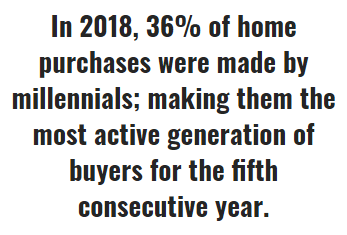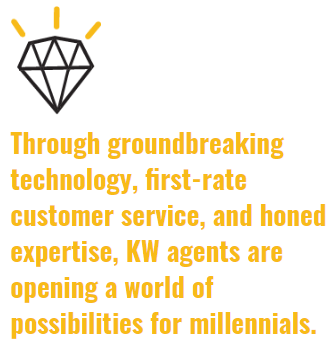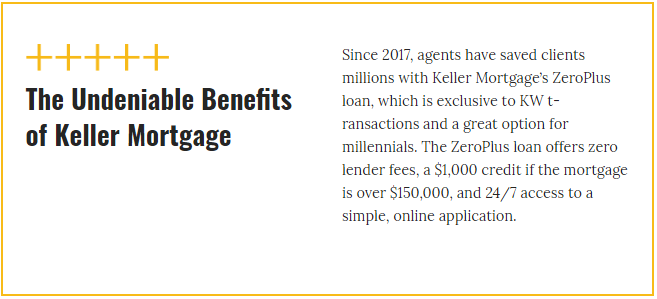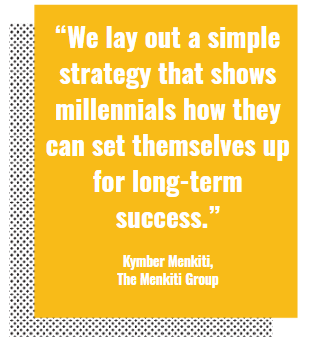Open a World of Possibility for Aspiring Millennial Homeowners
Published: Jan. 21 2020
Millennials, defined as those born between the years of 1980 and 1994, have been projected to overtake baby boomers this year as their population swells to 73 million. It’s a demographic shift that’s being reflected in the housing market. According to a study by the National Association of Realtors, millennials accounted for over one-third (36%) of all home purchases in 2018; making them the most active generation of buyers for the fifth consecutive year.

With their desire for a more tech-savvy buying and selling experience, and even preferences like shorter stays in a starter home – six years, on average, versus the 10 most home buyers project – millennials are shifting the industry. And Keller Williams agents are going above and beyond for millennial clients as they pursue their real estate goals.
Speed is Key
Rachel Major, CEO of Major Homes in Grandville, Michigan, was 23 when she closed on her first home and, like others, rented out part of her property. She followed in the footsteps of her grandmother, an agent for 20 years, and her father, who owned rental properties. She sees her role helping millennial clients as one of an adviser.
“I’ve been there, and experienced what my clients have, because I’m a millennial too,” she says. “I reassure and remind them that I’m here to help them navigate this market in a timely manner.”
In Michigan, the average inspection period is 10 days, but Major has gotten that down to five or even three. The quick turnaround is a result of close relationships she’s developed with a handful of inspectors who commit to working homes for her clients within two days of an offer being accepted.
To close quickly and efficiently, Major points to over-communication with the listing agent. She asks several questions:

-
What kind of offer are your sellers looking for?
-
Do they care more about price or possession?
-
Are they reserving any items?
-
Would they like more time after closing?
-
Do they want a quick closing?
-
Are they okay with a buyer letter or escalation clause?
Major also isn’t afraid to tell clients when a purchase doesn’t make sense, and when it does, she helps them see all options. “Millennials like options,” she says.
For example, one client’s lender said they could only afford up to a $180,000 FHA loan. Major connected them with a loan officer she knows who presented her client with three different financing options and routes to get there. “It was explained in detail, and they were so happy,” she says.
Explore Financials
Many millennials, overwhelmed with the idea of a down payment, have closed the door to homeownership. But there are several creative ways to leverage money to make homeownership tangible:
-
Utilize home equity lines of credit
-
Rent out rooms (money that can go toward a mortgage)
-
Investigate Federal Housing Administration (FHA)
-
loan programs
-
Co-sign with a parent or trusted family member
The key is to help millennial clients find the right lender. In the ever-changing industry, staying up-to-date on new mortgage loan products and guidelines is crucial, says David Eckert, of Keller Mortgage.
Per Eckert, borrowers should look for the following in their lender:
-
Accessibility: A lender who is accessible and available to answer questions promptly.
-
Knowledge: A lender who is well-versed in the various types of mortgages available and who understands that one size doesn’t fit all.
-
Patience: A lender who doesn’t put pressure on a borrower or rush them to make
-
Communication: A lender who keeps borrowers informed throughout the process. decisions.
“Borrowers should feel like a priority, never a bother to their lender,” reminds Eckert.

Recognizing Homeownership Myths Versus Facts
Even with a reputable lender, homeownership can feel out of reach for millennials who are saddled with student debt and high home prices. Thoughtful real estate agents recognize this and replace homeownership fears with facts, unveiling the possibilities hiding behind the myths.
Myth #1
I need a 20% down payment.
Eckert shares how this isn’t the case.
“United States Department of Agriculture (USDA) loans and VA home loans offer options with a 0% down payment,” he says. “Millennials can also finance conventional, non-governmental loans with as little as 3% down, and often at the same rate as when they put 20% down and with reduced mortgage insurance premiums.”
Unique financing options are growing for those with less than-excellent credit, a minimal credit history, or limited funds for a down payment, he reminds.
Myth #2
Renting is cheaper than buying.
After witnessing and experiencing the effects of the 2008 financial crisis, millennials may be hesitant to make a large purchase or take on extra debt. If you have a reluctant client, Eckert recommends running a rent-versus-buy scenario for a client’s area, which often shows it’s more affordable to buy than rent, especially in higher rent areas.
Myth #3
I can’t buy because of student loan debt.
In Portland, Oregon, Chris Suarez, founder of Xperience Real Estate, uses a multi-prong approach to help millennials conquer their fear of purchasing a home in the wake of student debt.
Young people with college debt usually put nearly half of their income toward these loan payments, according to a 2017 study in Th e Journal of Consumer Affairs, and delay buying their first home as a result. Suarez has trained agents– many of who are millennials themselves – to consult at a high level to assist clients facing such obstacles.
“To serve millennials to the best of our ability, we have to demonstrate the highest level of financial consulting,” he says. “This includes making sure they are aware of OR have access to multiple loan options.”
Agents are also trained to use KW’s consumer app and find success with Keller Mortgage.

An Eye For Investing
The shift millennials have prompted isn’t just in the United States – it crosses North America, as well as overseas. In the U.S. and Canada, just over a third of millennials have bought a house or flat, according to a recent HSBC survey. In Mexico, it’s 46%, and in China, a whopping 70% have been able to purchase their own property.
Overall, millennials share similar wants when it comes to real estate. Many are looking to buy a newly constructed home rather than a fixer-upper and are flocking to urban centers. Some millennials are also choosing to rent in cities but purchase a home in the country. Many young New Yorkers, for example, have bought homes in the Hudson Valley while they rent an apartment in one of the city’s five boroughs.

To reach this evolving segment, Kymber Menkiti, president of sales with the Menkiti Group in Washington, D.C., and her team have developed a tried-and-true method – first-time home-buying and investor seminars showing them how the home they buy doesn’t have to be the one they live in.
They’re an effective and low-cost resource for education and lead generation, Menkiti says. She and her team deliver two to three hour-long and memorable seminars per month, including a live testimonial and a call to download the KW mobile app. Seminars have helped fuel their pipeline of clients, and they’ve made for many satisfied millennials.
“We’ve found that many millennials are interested in becoming investors first,” says Menkiti. “They want a less permanent lifestyle commitment that still generates cash flow and equity. We don’t just show millennials that it’s possible, we lay out a simple strategy that shows them how they can set themselves up for long-term success while enjoying the short term.”
The Experts

